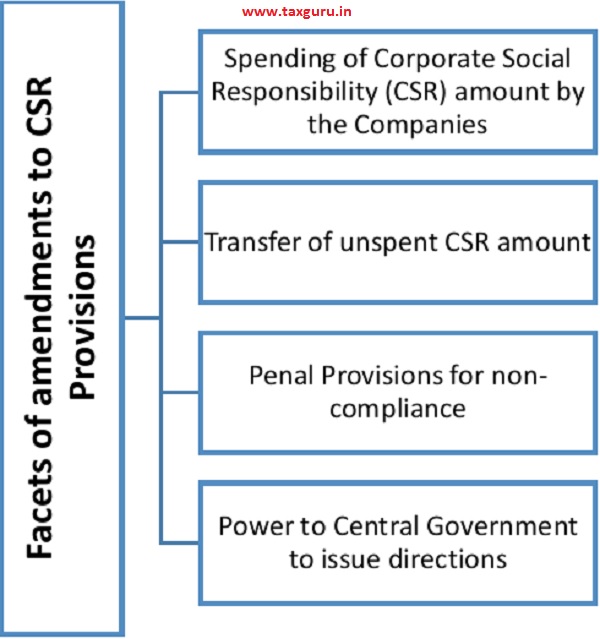“Legitimate profit earning can not be devoid of social responsibility, and that companies can not get away without meeting corporate social responsibility requirements.”
– Ms. Nirmala Sitharaman
(Minister of Finance)
With the Corporate Social Responsibility (CSR), Companies are able to develop their own social investment strategies and decide where to invest and implement programs, but the government has recommended particular areas of need, including eradicating hunger and poverty, maternal and child health, promoting gender equality and environmental sustainability etc. Companies should give preference to the local areas where they operate. If a company does not conduct its own Corporate Social Responsibility (CSR), it can give the required amount to the government’s socio-economic welfare programs such as the Prime Minister’s National Relief Fund.
When the provision for Corporate Social Responsibility (CSR) was introduced by Companies Act 2013, It was being said by the Government that the provision for Corporate Social Responsibility (CSR) will follow what is globally known as “Comply or Explain (COREX)”, Which means the Companies will not be mandated to spend on Corporate Social Responsibility (CSR) and the Board Report will only give reasons for not spending.
However, The Companies (Amendment) Act, 2019 has amended the Section 135 of the Companies Act, 2013 with respect to following facets;

♠ Spending of Corporate Social Responsibility (CSR) amount by the Companies:
As per the Companies (Amendment) Act, 2019, for the purpose of calculating CSR expenditure, a newly incorporated company that has not completed 3 years from the date of its incorporation is required to calculate its average net profit for the years so completed.
“It was easy for people to interpret that either we comply or we give an explanation and get away with it. Now that is not happening because Section 135 of the Companies Act, 2013 is being amended to provide specific penal provision in case of non-compliance.” said Ms. Nirmala Sitharaman.
Further, the Ministry of Corporate Affairs (MCA) is now able to give directions to companies to ensure the compliance with CSR norms.
♠ Transfer of unspent CSR amount:
The Companies (Amendment) Act, 2019 has created two positions with respect to transfer of unspent CSR amount;
1. The Company has ongoing CSR project;
2. The Company does not have any ongoing CSR project.
|
Position – 1: The Company has ongoing CSR project |
|
| ♦ |
Any unspent CSR amount which is related to an ongoing CSR project subject to fulfilling of prescribed conditions, such unspent CSR amount shall be transferred by the Company within a period of 30 days from the end of the financial year to a special account to be opened by the Company in that behalf for that financial year in any scheduled bank which shall be called as the Unspent Corporate Social Responsibility Account. |
| ♦ |
Such unspent CSR amount shall be spent by the Company in pursuance of its obligation towards the Corporate Social Responsibility Policy within a period of 3 financial years from the date of such transfer, if the Company fails to so the same then the Company shall transfer the same to a Fund specified in Schedule VII of the Companies Act, 2013, within a period of 30 days from the date of completion of the third financial year. |
|
Position – 2: The Company does not have any ongoing CSR project |
|
| ♦ |
In case the unspent amount does not relate to any ongoing CSR project then such unspent CSR amount shall be transferred to a Fund specified under Schedule VII of the Companies Act, 2013 within a period of 6 months from the end of the financial year. |
♠ Penal Provisions for non-compliance:
The Companies (Amendment) Act, 2019 has inserted penal provisions for non-compliance as under;

♠ Power to Central Government to issue directions:
The Companies (Amendment) Act, 2019 has provided power to the Central Government, through which the Central Government may issue general or specific directions to a Company of class of Companies as it considers necessary to ensure compliance of provisions of the Section 135 of the Companies Act, 2013 and such Company or class of Companies shall comply with such directions.
Earlier, even if the Company does not meet the CSR obligation, then also Companies have merely received notices from the Ministry of Corporate Affairs probing the reasons for not meeting the CSR obligation. After the Companies (Amendment) Act, 2019, not meeting the CSR obligation carries penal consequences. The amendment to Section 135 of the Companies Act, 2013 through the Companies (Amendment) Act, 2019 is to bring in more efficacy to the CSR regime.





